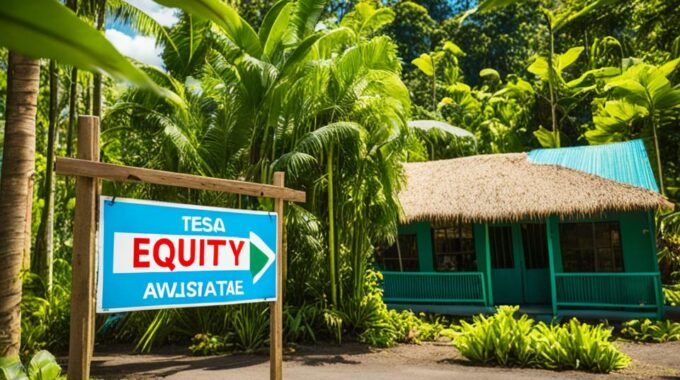Discover expert property investment financing in Costa Rica with GAP Equity Loans. We offer tailored solutions for foreign investors and expats seeking real estate opportunities.

Exploring Home Equity Loans for Financial Emergencies in Costa Rica
Homeowners in Costa Rica can utilize home equity loans provided by GAP Equity Loans for financial emergencies. These loans allow borrowers to borrow from $50,000 and up, with interest rates ranging from 12% to 16% and loan terms ranging from 6 months to 3 years. This provides quick and secure financing options for unexpected expenses, bridging the gap between paychecks. Borrowers can use their Costa Rican property as collateral to secure the loan.
Key Takeaways:
- Home equity loans offer quick and secure financing options for homeowners in Costa Rica.
- GAP Equity Loans provides loans starting from $50,000 with interest rates ranging from 12% to 16%.
- Loan terms can vary from 6 months to 3 years, providing flexibility for borrowers.
- Costa Rican property can be used as collateral to secure the loan.
- These loans bridge the financial gap during emergencies, providing homeowners with the funds they need.
How to Apply for a Home Equity Loan in Costa Rica
Applying for a home equity loan in Costa Rica is a straightforward process. With GAP Equity Loans, borrowers can easily apply online and enjoy the convenience of same-day cash availability. The loan process is transparent, ensuring that borrowers have a clear understanding of the terms and conditions.
To apply for a home equity loan, borrowers are typically required to provide personal and financial information, including proof of income. This information helps lenders assess the borrower’s ability to repay the loan. The loan terms and conditions may vary depending on the lender and the borrower’s credit history. Therefore, it is important for borrowers to compare options from different lenders to find the best terms and rates.

When applying for a home equity loan, borrowers should also consider the value of their Costa Rican property, as it will serve as collateral for the loan. It is advisable to work with reputable lenders like GAP Equity Loans to ensure a smooth and secure loan process. By following these steps, borrowers can access the funds they need quickly and easily.
Benefits of Applying for a Home Equity Loan
A home equity loan in Costa Rica offers several benefits for borrowers. First and foremost, it provides quick and secure financing options in times of financial emergencies. Borrowers can rely on the equity in their property to access the funds they need without the lengthy approval process of traditional banks.
Another advantage of a home equity loan is the flexibility it offers in terms of repayment options. Borrowers can choose a loan term that suits their financial situation, whether it’s a shorter term for quick repayment or a longer term for lower monthly payments.
Additionally, a home equity loan often comes with competitive interest rates, making it an affordable option for borrowers. By leveraging their property’s equity, borrowers can benefit from lower interest rates compared to other types of loans.
Benefits of Home Equity Loans for Financial Emergencies in Costa Rica
Home equity loans in Costa Rica offer several advantages for borrowers facing financial emergencies. These loans provide quick access to funds, ensuring that individuals can secure the financing they need in a timely manner. With a streamlined application process and efficient approval times, borrowers can obtain the funds they require to address unexpected expenses or bridge the gap between paychecks.
One of the key benefits of home equity loans is their secure nature. By using their Costa Rican property as collateral, borrowers can obtain financing at competitive interest rates, often lower than those offered by traditional banks. This provides peace of mind and financial stability during times of crisis.
Additionally, home equity loans come with flexible repayment options. Borrowers can choose a loan term that fits their financial situation, allowing them to manage their debt effectively. Whether they prefer shorter or longer loan terms, borrowers have the flexibility to tailor their repayment plans to best suit their needs.
Another advantage of home equity loans is the competitive interest rates they offer. With rates that are often lower than other types of loans or credit options, borrowers can save money over the course of their loan repayment. This makes home equity loans an affordable option for individuals in need of quick financial assistance.
Summary:
- Home equity loans in Costa Rica provide quick and secure financing options for financial emergencies.
- Borrowers can access funds in a timely manner, bridging the gap between paychecks.
- These loans offer flexibility in repayment options, allowing borrowers to choose a loan term that fits their financial situation.
- Competitive interest rates make home equity loans an affordable option for borrowers.

| Advantages of Home Equity Loans for Financial Emergencies in Costa Rica |
|---|
| Quick and secure financing options |
| Flexible repayment options |
| Competitive interest rates |
Alternative Financing Options in Costa Rica
When it comes to financing options in Costa Rica, homeowners have more than just home equity loans at their disposal. Alternative options such as in-house financing and seller financing offer additional flexibility for those seeking financial assistance. Another option worth exploring is the use of a Self Directed IRA, which allows individuals to invest in real estate using their retirement funds. Additionally, home equity lines of credit (HELOC) from one’s home country can also be used to finance investments in Costa Rica.
In-house financing is a popular choice among developers in Costa Rica. This option involves the developer acting as the lender, providing the necessary financing for the purchase of a property. Seller financing, on the other hand, involves the seller of the property financing part or all of the purchase price. These options can be particularly beneficial for individuals who may not qualify for traditional bank loans or prefer more flexible terms.
“Alternative financing options such as in-house financing and seller financing provide homeowners in Costa Rica with more flexibility and accessibility when it comes to securing financing for their property purchases,” says John Rodriguez, a real estate expert in Costa Rica.
For those looking to invest in Costa Rica, utilizing a Self Directed IRA can be an attractive option. This method allows individuals to invest their retirement funds in real estate, providing a tax-advantaged way to finance their investments. Investors have the ability to choose the types of properties they wish to invest in, giving them greater control over their investment decisions.
Lastly, individuals can also consider using home equity lines of credit (HELOC) from their home country to finance their investments in Costa Rica. This option allows homeowners to leverage the equity in their primary residence to obtain a line of credit that can be used for various purposes, including property investments in Costa Rica.

Table: Comparison of Alternative Financing Options
| Financing Option | Key Features | Pros | Cons |
|---|---|---|---|
| In-House Financing | Developer acts as lender | Accessible financing for property purchase | Potential higher interest rates |
| Seller Financing | Seller provides financing | Flexible terms, suitable for buyers with limited credit history | May involve higher down payment requirements |
| Self Directed IRA | Investment using retirement funds | Tax-advantaged investment, greater investment control | Restrictions on types of eligible investments |
| Home Equity Lines of Credit (HELOC) | Line of credit using home equity | Flexibility to use funds for various purposes | Interest rates and fees vary, potential impact on primary residence |
The Potential of the Costa Rican Pension System for Investment
The Costa Rican pension system presents a significant investment potential, with investments managing approximately 50% of the country’s GDP. This extensive capital allocation illustrates the country’s strong commitment to long-term financial planning and economic growth. One of the key components of the Costa Rican pension system is the Mandatory Complementary Pension Regime (ROPC), which alone represents around 25% of the GDP with a capital of about $15 billion.
Recognizing the importance of sustainable and responsible investment, the Costa Rican government has set a deadline for investment managers to incorporate these policies into their investment management practices by December 2023. This initiative aims to encourage private sector participation in institutional projects that promote sustainable development and create a positive impact on society and the environment. These investments align with Costa Rica’s commitment to sustainable development goals and contribute to the country’s overall economic growth.
“The Costa Rican pension system is an attractive investment opportunity for those looking to align their financial goals with sustainable and responsible investment practices.”
Table: Investments in the Costa Rican Pension System
| Investment | Percentage of GDP |
|---|---|
| Mandatory Complementary Pension Regime (ROPC) | 25% |
| Other Pension Funds | 25% |
| Insurance Companies | 20% |
| Private Investment Funds | 15% |
| Individual Retirement Accounts (IRAs) | 10% |
| Other Institutional Investors | 5% |
Table: Investments in the Costa Rican Pension System
The table above provides an overview of the distribution of investments in the Costa Rican pension system. It highlights the significant contribution of the Mandatory Complementary Pension Regime (ROPC) along with other pension funds, insurance companies, private investment funds, individual retirement accounts (IRAs), and other institutional investors. Together, these investments play a vital role in shaping the financial landscape of Costa Rica and driving economic growth.
The Role of the Private Sector in Financing Institutional Projects
The private sector plays a crucial role in financing institutional projects that promote economic and human development in Costa Rica. With the country’s level of government indebtedness, private sector intervention is essential to secure funding for projects such as the construction of roads, schools, and support for the child care network. By collaborating with the private sector, Costa Rica can accelerate its development and meet its national priorities.
Innovative financing instruments are key in enabling private sector collaboration. These instruments provide alternative funding options and attract investors who are willing to contribute to the country’s growth. They allow for the mobilization of private capital towards projects that aim to promote economic development and improve the quality of life for the people of Costa Rica.
“The private sector’s participation in financing institutional projects is crucial for driving sustainable development and achieving our national goals. By leveraging innovative financing instruments, we can attract investment and create a positive impact on the economy and society as a whole.”
Promoting Economic and Human Development
Financing from the private sector not only contributes to economic growth but also plays a vital role in human development. By investing in institutional projects, such as the construction of schools and social infrastructure, the private sector helps create opportunities for education, healthcare, and employment, improving the overall well-being of the population.
Green Investment for Climate Change Mitigation and Poverty Eradication
The private sector can also play a significant role in advancing environmental sustainability and addressing climate change challenges. By investing in green projects and technologies, such as renewable energy and sustainable agriculture, the private sector contributes to climate change mitigation and helps protect Costa Rica’s rich natural resources, which are crucial for the country’s long-term economic and social well-being.
Furthermore, private sector investment can contribute to the eradication of poverty in coastal areas by supporting projects that promote economic opportunities, infrastructure development, and social programs. This creates sustainable livelihoods for coastal communities and reduces inequalities, ensuring that the benefits of economic growth are shared equitably.
| Benefits of Private Sector Financing | Examples |
|---|---|
| Promotes economic and human development | Construction of roads, schools, and social infrastructure |
| Advances environmental sustainability | Investment in renewable energy and sustainable agriculture |
| Contributes to poverty eradication | Support for economic opportunities and social programs in coastal areas |
The private sector’s involvement in financing institutional projects in Costa Rica is crucial for driving sustainable development, promoting economic growth, and improving the lives of its people. By leveraging innovative financing instruments and investing in projects that prioritize economic, social, and environmental sustainability, the private sector can contribute to a prosperous and resilient future for Costa Rica.
Creating Financial Instruments to Enable Private Sector Collaboration
Creating financial instruments that facilitate private sector collaboration is crucial for promoting economic growth in Costa Rica. These instruments should allow timely participation by potential financiers and guarantee performance for the final consumer or individuals contributing to their pensions. To achieve this, the United Nations, together with organizations such as ACOP and the Superintendency of Pensions, is working towards creating these financial instruments.
One example of a financial mechanism that could be used is green investment private equity funds. These funds can attract private sector investments into projects that promote sustainable development and contribute to the country’s environmental goals. Another possible instrument is the development of mechanisms for social housing, which can help meet the growing demand for affordable housing in Costa Rica.
“Creating financial instruments that enable private sector collaboration is essential for driving economic growth and achieving sustainable development goals in Costa Rica.”
Additionally, public debt management mechanisms can be utilized to promote investment in coastal areas and tourism. These mechanisms would provide investors with the confidence they need to fund projects in these regions, fostering economic development and job creation.
| Financial Instruments | Purpose |
|---|---|
| Green Investment Private Equity Funds | Attract private sector investments into sustainable development projects |
| Mechanisms for Social Housing | Address the demand for affordable housing in Costa Rica |
| Public Debt Management Mechanisms | Promote investment in coastal areas and tourism |
By creating these financial instruments, Costa Rica can facilitate sustainable and responsible investments, promoting economic growth and achieving its national development goals. These collaborative efforts between the private sector, government organizations, and international entities will help drive the country towards a prosperous and sustainable future.
The Importance of Responsible and Sustainable Investments
Sustainable development is a priority on the global agenda, and responsible investments play a vital role in achieving this objective. The United Nations advocates for sustainable development, encouraging individuals and organizations to consider environmental, social, and governance criteria when making investment decisions. By incorporating these principles into their strategies, investors can contribute to the health of the planet while also generating financial returns.
Financial institutions, such as pension funds and insurers, have a crucial role to play in driving responsible and sustainable investments. These institutions hold significant capital and can channel it towards projects and initiatives that align with sustainable development goals. By creating financial instruments tailored to the needs of pension funds and insurers, investment managers can facilitate the allocation of funds towards impactful projects.
“Responsible and sustainable investments consider environmental, social, and governance criteria, ensuring that projects align with sustainable development goals.”
Responsible and sustainable investments have a positive relationship with economic growth. They promote long-term stability and resilience, fostering an environment that benefits both businesses and communities. By investing in projects that prioritize sustainability, investors can contribute to job creation, economic development, and social progress. These investments have the potential to generate financial returns while simultaneously addressing pressing global challenges.
By prioritizing responsible and sustainable investments, Costa Rica can play a leading role in promoting sustainable development and setting an example for other nations. Through collaboration between investors, financial institutions, and government entities, the country can create a robust ecosystem that supports impactful projects. This will not only contribute to economic growth but also ensure a brighter future for generations to come.

Conclusion
Home equity loans in Costa Rica offer homeowners the financial flexibility they need during emergencies. With GAP Equity Loans as a trusted lender, borrowers can access quick and secure financing options. These loans provide a lifeline to individuals facing unexpected expenses, bridging the gap between paychecks.
For those seeking alternative financing options, in-house financing and seller financing are available. Additionally, Costa Rica’s pension system presents a significant investment potential, encouraging private sector collaboration in financing institutional projects that promote economic and human development.
Responsible and sustainable investments are crucial in driving economic growth and meeting national development priorities. By considering these options and working with reputable professionals, individuals in Costa Rica can navigate financial emergencies and achieve their financial goals.
FAQ
How much can I borrow with a home equity loan from GAP Equity Loans?
Borrowers can borrow from $50,000 and up with a home equity loan from GAP Equity Loans.
What are the interest rates for home equity loans in Costa Rica?
The interest rates for home equity loans in Costa Rica range from 12% to 16%.
What are the loan terms for home equity loans in Costa Rica?
The loan terms for home equity loans in Costa Rica range from 6 months to 3 years.
How can I apply for a home equity loan in Costa Rica with GAP Equity Loans?
You can apply online with GAP Equity Loans and receive the funds on the same day.
What information do I need to provide when applying for a home equity loan?
You will need to provide personal and financial information, along with proof of income, when applying for a home equity loan.
What are the benefits of home equity loans in Costa Rica?
Home equity loans provide quick and secure financing options for financial emergencies, with flexible repayment options and competitive interest rates.
Are there alternative financing options in Costa Rica?
Yes, buyers can explore in-house financing options, seller financing, and utilize a Self Directed IRA or a home equity line of credit (HELOC) from their home country.
What is the potential of the Costa Rican pension system for investment?
The Costa Rican pension system has significant investment potential, with investments managing approximately 50% of the country’s GDP.
What is the role of the private sector in financing institutional projects in Costa Rica?
The private sector plays a crucial role in financing institutional projects, such as the construction of roads and schools, support for the child care network, and green initiatives for climate change mitigation.
How can financial instruments be created to enable private sector collaboration?
Financial instruments can be created to allow timely participation of potential financiers and guarantee performance for the final consumers or individuals contributing to their pensions.
Why are responsible and sustainable investments important in Costa Rica?
Responsible and sustainable investments promote economic growth and meet national development priorities, while considering environmental, social, and governance criteria.
Source Links
- https://www.gapequityloans.com/en/fixed-rate-gap-equity-loans-home-equity-costa-rica/
- https://jointsdgfund.org/article/costa-rica-explores-new-financial-instruments-sustainable-development-and-improvement-life
- https://www.gapequityloans.com/en/emergency-gap-equity-loans-costa-rica/
Article by Glenn Tellier (Founder of CRIE and Grupo Gap)



